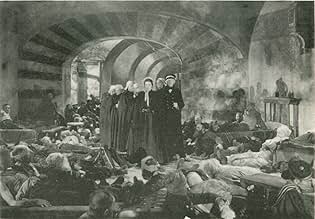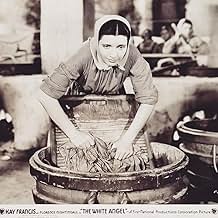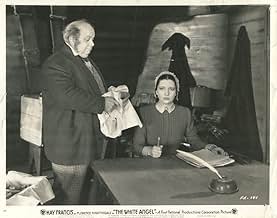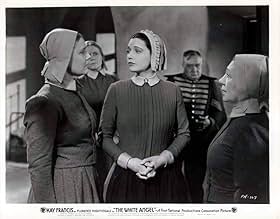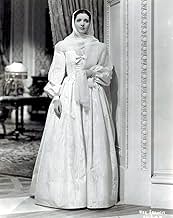IMDb RATING
6.6/10
445
YOUR RATING
A look at the life of Florence Nightingale.A look at the life of Florence Nightingale.A look at the life of Florence Nightingale.
- Awards
- 2 wins & 1 nomination total
Lillian Kemble-Cooper
- Parthenope 'Parthe' Nightingale
- (as Lillian Cooper)
Featured reviews
The White Angel which was a film about the crucial years in the life of Florence
Nightingale when she during the Crimean War popularized the career of nursing
for women and sanitary hospitals. Her work in Great Britain and Clara Barton in
the USA during the Civil War set the standards for the nursing profession as we
know it now.
Nightingale came from an upper class background and that probably stood her in good stead because someone who had to worry about how the next month's rent was to be paid or the next meal coming from could not have taken on what she did or faced down the sexist attitudes of her age.
The British cinema did the best version of her life in 1951 with Anna Neagle playing Nightingale. Besides Florence herself the real name of only one other character is used, that of Lord Raglan the Commander of the British forces in the Crimea played here by Halliwell Hobbes. The real players are used in the Neagle film.
This was a change of pace for Kay Francis who usually was more glamorous in her roles than here. Francis reminds me a lot of Rosaland Russell when she did Sister Kenny.
This was part of Warner Brothers biographical films of the late 30s and The White Angel was the only one to have a female subject. The White Angel bogs down a bit in spots and for a more accurate film the Neagle picture is better. Still this is reasonably entertaining and Kay Francis fans will like it.
Nightingale came from an upper class background and that probably stood her in good stead because someone who had to worry about how the next month's rent was to be paid or the next meal coming from could not have taken on what she did or faced down the sexist attitudes of her age.
The British cinema did the best version of her life in 1951 with Anna Neagle playing Nightingale. Besides Florence herself the real name of only one other character is used, that of Lord Raglan the Commander of the British forces in the Crimea played here by Halliwell Hobbes. The real players are used in the Neagle film.
This was a change of pace for Kay Francis who usually was more glamorous in her roles than here. Francis reminds me a lot of Rosaland Russell when she did Sister Kenny.
This was part of Warner Brothers biographical films of the late 30s and The White Angel was the only one to have a female subject. The White Angel bogs down a bit in spots and for a more accurate film the Neagle picture is better. Still this is reasonably entertaining and Kay Francis fans will like it.
... in that the only reason I can figure this film is legendary as a bomb is that Kay Francis was not accepted in her role just as Clark Gable was not accepted at the time in Parnell.
Francis was normally the leading lady in sparkling romantic comedies, her most prolific years being the precode ones. She also played the tragic figure in romantic dramas where she might sacrifice to protect a child, or she was misunderstood and believed to be unfaithful and ostracized, or was partnered up with an abusive man. But playing 19th century pioneering nurse Florence Nightingale? This was a complete departure and would be as odd as seeing Errol Flynn play Abraham Lincoln.
Plus Kay doesn't project much genuine emotion during the film. Somebody Florence might have married had she taken the conventional path dies right before her eyes and ... nothing? No tears? Since director Dieterle also directed Paul Muni in The Story of Louis Pasteur the year before, there is no explanation for what happened here.
This film actually didn't bomb, but it was the beginning of the end of Kay at Warner Brothers as her relationship with Jack Warner quickly deteriorated and he realized that Bette Davis was the studio's female star of the present and future.
One thing the film did particularly poorly - All of those intertitles! Some of them are so busy it is like reading a book. Eight years past the transition to sound and this device had been largely abandoned as directors learned to change scenes without it.
This one is worth your time if you forget your preconceived notions about its classification as a bomb and just give it a fair chance.
Francis was normally the leading lady in sparkling romantic comedies, her most prolific years being the precode ones. She also played the tragic figure in romantic dramas where she might sacrifice to protect a child, or she was misunderstood and believed to be unfaithful and ostracized, or was partnered up with an abusive man. But playing 19th century pioneering nurse Florence Nightingale? This was a complete departure and would be as odd as seeing Errol Flynn play Abraham Lincoln.
Plus Kay doesn't project much genuine emotion during the film. Somebody Florence might have married had she taken the conventional path dies right before her eyes and ... nothing? No tears? Since director Dieterle also directed Paul Muni in The Story of Louis Pasteur the year before, there is no explanation for what happened here.
This film actually didn't bomb, but it was the beginning of the end of Kay at Warner Brothers as her relationship with Jack Warner quickly deteriorated and he realized that Bette Davis was the studio's female star of the present and future.
One thing the film did particularly poorly - All of those intertitles! Some of them are so busy it is like reading a book. Eight years past the transition to sound and this device had been largely abandoned as directors learned to change scenes without it.
This one is worth your time if you forget your preconceived notions about its classification as a bomb and just give it a fair chance.
I come from a family of nurses, so I watched this film with interest.
Kay Francis plays Florence Nightingale, the founder of modern nursing. Mostly the film covers her work in the Crimea.
This is a typical '30s movie - Nightingale meets with a great deal of resistance, which she probably did in real life. The villains here are somewhat cliched in their nastiness and refusal to help her make any progress. A typical good vs. Evil fight.
I read a lot of criticism about Kay Francis - this was an unusual role for her, where she's not playing a woman of the world. I thought she portrayed a quiet strength and dignity.
Someone said Bette Davis would have been better. Bette Davis was wonderful, but I didn't feel Nightingale needed a fiery portrayal. As far as criticism of Francis, Francis' interpretation was correct in that she was well-educated and came from a wealthy family.
Granted she's portrayed as a saint, but that's the fault of the script. I do believe that Nightingale, given her upbringing, was a strong and determined woman who used a velvet glove rather than an iron hand.
I found the film very absorbing and poignant.
Kay Francis plays Florence Nightingale, the founder of modern nursing. Mostly the film covers her work in the Crimea.
This is a typical '30s movie - Nightingale meets with a great deal of resistance, which she probably did in real life. The villains here are somewhat cliched in their nastiness and refusal to help her make any progress. A typical good vs. Evil fight.
I read a lot of criticism about Kay Francis - this was an unusual role for her, where she's not playing a woman of the world. I thought she portrayed a quiet strength and dignity.
Someone said Bette Davis would have been better. Bette Davis was wonderful, but I didn't feel Nightingale needed a fiery portrayal. As far as criticism of Francis, Francis' interpretation was correct in that she was well-educated and came from a wealthy family.
Granted she's portrayed as a saint, but that's the fault of the script. I do believe that Nightingale, given her upbringing, was a strong and determined woman who used a velvet glove rather than an iron hand.
I found the film very absorbing and poignant.
The sharp, focused performance by Kay Francis carries this film into an impressive arena for its viewer. I've seen in several times and although Francis doesn't go into histrionics in her portrayal like some of the "greats" would -- Francis exemplifies the determination, courage, and humaness of one who "feels a calling". She never wavers in what she is about, frustrated but not discouraged, and Francis' subtlety emphasises these qualities. The beginning of the film offers Francis a chance to don the elegant gowns of the mid 1800's, but most of the film she's wearing a plain nurse's uniform and often looking quite drawn from the conflicts with male prejudice on the Crimean front and the squalid conditions that she faced in all directions. I don't know how historically accurate the film is, but it gets to the heart of the Nightingale story and what she was up against. Strong support from players like Donald Crisp and Ian Hunter add to the overall success.
With a title like The White Angel, you kind of know what you're going to get, if you'll excuse the pun, a whitewash. Of course a person like Florence Nightingale should be celebrated for her achievements but this film presents her as a saint rather than a living, breathing and flawed human being. Again, no joke intended but the characters for her are depicted as heroic and those against her, villainous, so, rather black and white. A more serious biopic might have been entitled The Lady With the Lamp and indeed a passage of the film where various characters read out Longfellow's poem of the same name is one of the most effective and moving scenes of the film. German director, William Dieterle, known for many great movies such as the beloved 1939 version of The Hunchback of Notre Dame and more significantly, for me, 1941's masterpiece, The Devil and Daniel Webster, is a sure hand on the tiller and moves things along with pace and interest but is fighting a battle with the script. The best you can say of it, is it is of it's time. The worst affected is the star, Kay Francis, a fine actress who delivers with conviction but is encumbered with po faced and twee lines that beggar belief. Her talent is evident in that she still manages to make her role engaging. Fortunately, she also has a sterling cast to play alongside her; on the 'good' side the redoutable Halliwell Hobbes brings charisma in spades as Lord Raglan and Ferdinand Munier is enjoyably whimsical as the camp cook, Soyer. On the distaff side, Donald Crisp is effectively cold as Dr Hunt, Montagu Love, suitably oily as Bullock and Nigel Bruce, my reason for watching, is hugely pleasurable to watch as the pompous and condescending Dr West, and unlike the other two antagonists, manages to be likeable into the bargain. All three represent the crushing patriarchy that our heroine needs to overcome both in England and the Crimea. Striking a false note is Billy Mauch as drummer boy, Billy, so very American and so very twee that his appearances jar and take you out of the story. Talking of twee, the appearance of Queen Victoria's arm and her arm only, takes the biscuit! But to conclude at an hour and a half with first rate acting and direction this is a good biopic and with a stronger script could have been a excellent one.
Did you know
- TriviaMuch disagreement to the origin of the source material exists. Some contemporary sources believed the source was Lytton Strachey's 1918 biographical essay in "Eminent Victorians". Others contend Michael Jacoby was the author. Warner Bros. executive Hal B. Wallis contended that the life of Florence Nightingale was in the public domain, and that screenwriter Mordaunt Shairp did his own research. The MPAA agreed with Wallis; no source credit was necessary.
- GoofsWhen Florence is receiving the news on the steps of the hospital of the sinking of the French transport, the shadow of the boom microphone moves onto then quickly off her left sleeve.
- Crazy creditsPrologue: Towards the year 1850, England was at peace with the world. Her men were following her ships to the four corners of the earth, building the great empire that is Queen Victoria's monument. Women were only permitted to nod meek approval. In all England, only Her Majesty had the right to express herself with the independence of a man.
- ConnectionsFeatured in Breakdowns of 1936 (1936)
- SoundtracksAuld Lang Syne
(uncredited)
Traditional
Lyrics by Robert Burns
Incorporated into the score at the new year
Sung by the crowd celebrating the new year
Details
- Release date
- Country of origin
- Language
- Also known as
- The White Angel
- Filming locations
- Production companies
- See more company credits at IMDbPro
- Runtime
- 1h 32m(92 min)
- Color
- Sound mix
- Aspect ratio
- 1.37 : 1
Contribute to this page
Suggest an edit or add missing content



